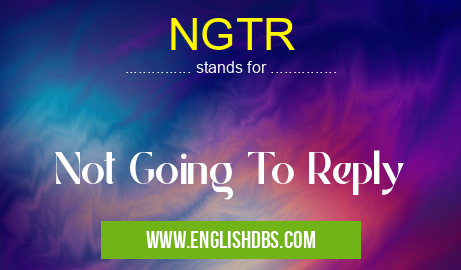What does NGTR mean in CHAT
The acronym NGTR is an Internet and text slang for "Not Going To Reply". It is used to indicate that a person or party has no intention of replying to a particular message or inquiry, be it an email, post on social media, chat message, or the like. This term is often used in response to inquiries that cannot be answered or when the recipient does not wish to engage in further conversation. For example, if one were to ask a question and receive an answer such as “NGTR” they would know that the party in question had no intention of continuing the discussion.

NGTR meaning in Chat in Internet
NGTR mostly used in an acronym Chat in Category Internet that means Not Going To Reply
Shorthand: NGTR,
Full Form: Not Going To Reply
For more information of "Not Going To Reply", see the section below.
Meaning
When someone sends a message with NGTR, they are essentially expressing that they will not answer any additional questions or comments about whatever topic was being discussed. This could be out of disinterest or simply because the sender did not have any more information to offer on the subject. It can also serve as a polite way to end the conversation without needing to write out a longer response.
Usage
The acronym NGTR can be used in all sorts of contexts depending on how it is used; however, it is important to note that this term should only be used when necessary and appropriate. For example, if someone were asking for help with something and they received a “NGTR” reply from another person then it would most likely come off as rude or unhelpful. On the other hand, if someone was asking an opinionated question then an answer such as “NGTR” might be more appropriate and socially acceptable in some cases.
Examples
To better understand how NGTR can be utilized in everyday conversations here are some examples of its usage: • If your friend asks you who you think should win an award, but you don't really care about the award show then you might respond with "NGTR" instead of writing out why you don't care about it. • If someone messages you asking for advice that you don't have then you could reply with "NGTR" instead of taking up their time trying to explain why you don't know what they're asking about. • If someone writes something inflammatory online and you don't want to get into an argument with them then "NGTR" is a great way end dialogue without making things worse by engaging further.
Essential Questions and Answers on Not Going To Reply in "INTERNET»CHAT"
What is NGTR?
NGTR stands for Not Going To Reply. It typically means that a person will not respond to any further communication regarding the given subject.
When should I use NGTR?
You should use NGTR when it would be inappropriate or unwelcome to continue engaging in the conversation, either because the particular dialogue has come to an end, or out of respect for the other person's perspective.
Can I change my mind after using NGTR?
Sure! Nothing is set in stone with matters of communication, and people are welcome to change their decisions about whether they want to continue talking about something or not.
How do I know if someone has used NGTR?
If someone uses the phrase "Not Going To Reply" or "NGTR," it is generally understood that they will no longer be participating in the conversation according to their own wishes.
Is there a polite way to use NGTR?
Absolutely! It can be as simple as saying something like "I appreciate your thoughts, but I'm going to have to respectfully disagree and won't be responding again. Thank you!"
Is there ever a time when I shouldn't use NGTR?
Generally speaking, no matter what kind of dialogue you're having, if someone is making personal attacks against you then using NGTR may not be appropriate and could even signal aggression instead of resolution. In these cases, consider deescalating the situation before deciding on a course of action.
Is there a difference between just not replying and specifically using “Not Going To Reply”?
Yes! Using “Not Going To Reply” lets the other person know that you have decided consciously and deliberately not to rejoin the conversation at this point in time - without leaving them wondering why you simply haven’t responded yet.
Is it possible for someone else to override my decision to use NGTR?
No – once you have used “Not Going To Reply” (or another form of ending communication similarly), it is up exclusively up to you whether or not you wish to pursue further discussion on that topic with that particular person or group.
Are there any potential risks associated with using “Not Going To Reply”?
While generally speaking “Not Going To Reply” is perfectly fine and appropriate usage in most conversations - depending on context - it can sometimes come across as abrupt or uncaring due its finality, so take care before employing it so as not inadvertently offend anyone unnecessarily.
Final Words:
In conclusion, NGTR stands for "Not Going To Reply" and should only be used when deemed necessary and appropriate for each situation while being conscious of context and potential outcomes. By using this term sparingly one can avoid unnecessary arguments while conveying their desire not to engage in further dialogue without coming off as rude or inconsiderate towards others.
